Legal Aspects of Business: Agency Law, Duties, Conflicts, and Cases
VerifiedAdded on 2023/01/12
|9
|3210
|34
Report
AI Summary
This report delves into the legal aspects of agency within the context of business operations, focusing on the roles and responsibilities of agents and principals. It defines agency as a relationship where one party (the agent) acts on behalf of another (the principal), exploring the creation of agencies through express appointment and the Tripartite relationship involving the agent, principal, and a third party. The report outlines key agent duties, including the duty of care and skill, the duty to follow lawful instructions, the duty to avoid conflicts of interest, the duty to account, the duty not to delegate authority, and the duty not to accept bribes or secret profits. Case law examples, such as the UK insurance company case, are used to illustrate these duties and their relevance in modern business scenarios. The report highlights the significance of agency in facilitating business transactions and resolving issues, emphasizing the importance of ethical conduct and adherence to legal obligations within the agency relationship. The document further explains the relevance of agencies to modern data business.
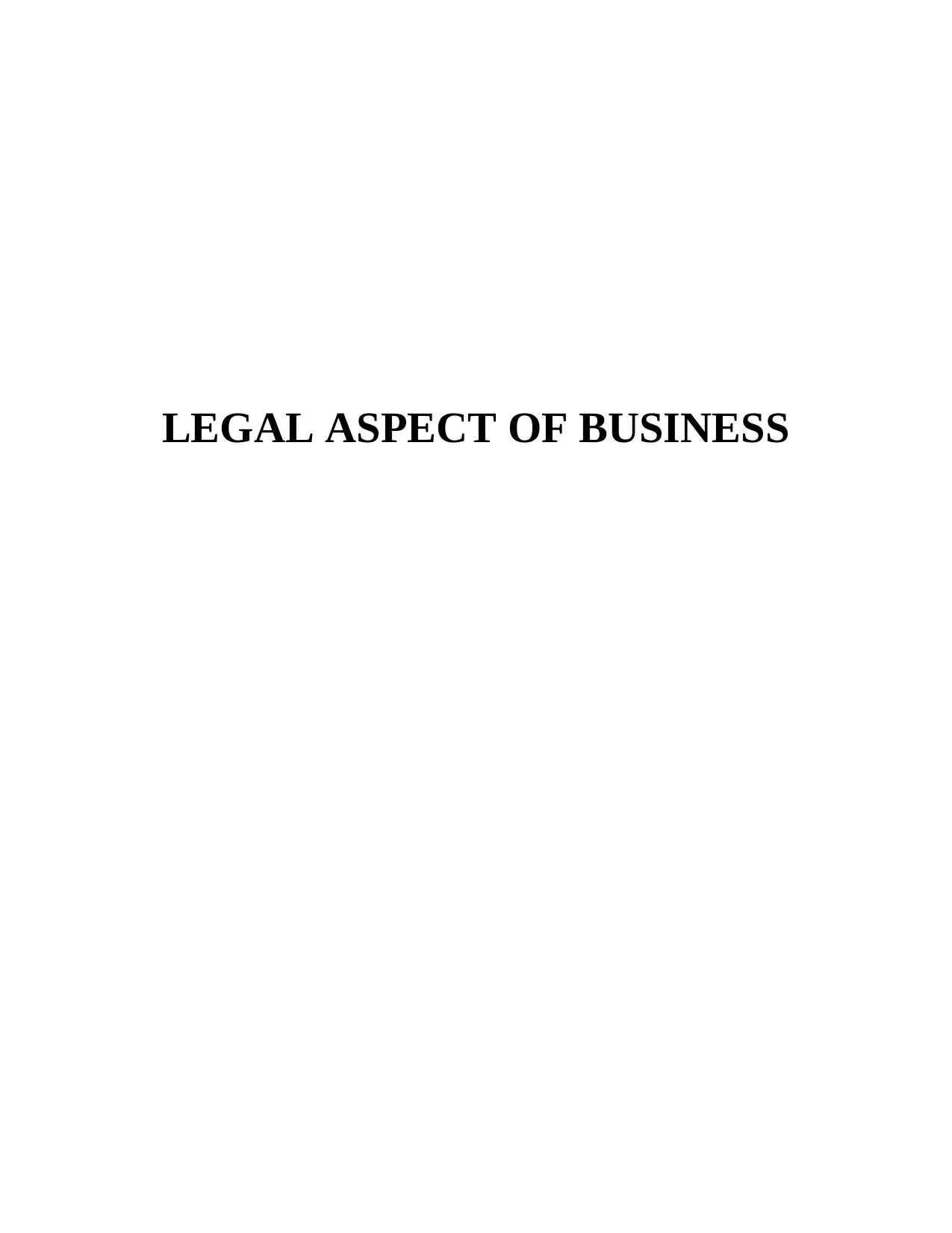
LEGAL ASPECT OF BUSINESS
Paraphrase This Document
Need a fresh take? Get an instant paraphrase of this document with our AI Paraphraser
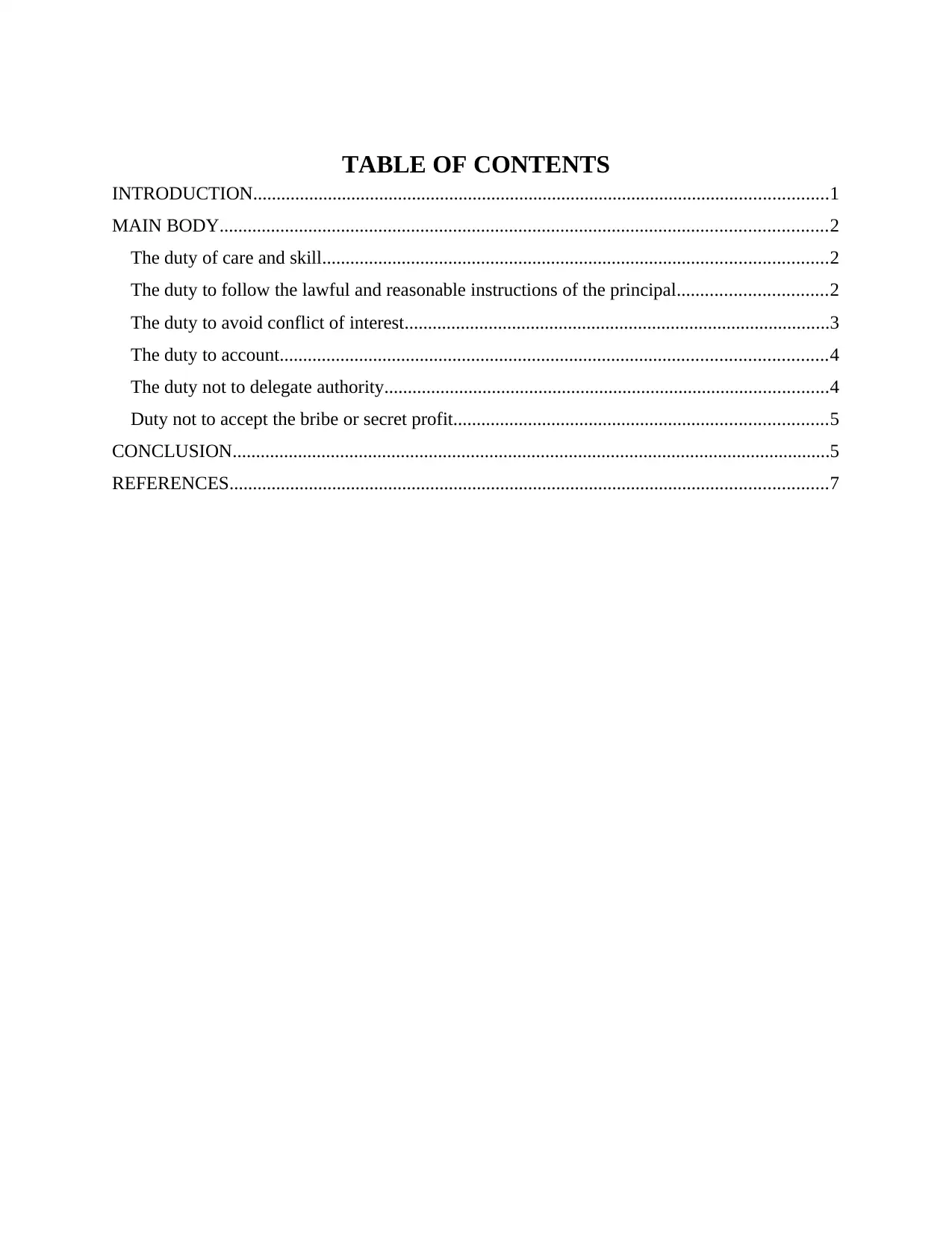
TABLE OF CONTENTS
INTRODUCTION...........................................................................................................................1
MAIN BODY..................................................................................................................................2
The duty of care and skill............................................................................................................2
The duty to follow the lawful and reasonable instructions of the principal................................2
The duty to avoid conflict of interest...........................................................................................3
The duty to account.....................................................................................................................4
The duty not to delegate authority...............................................................................................4
Duty not to accept the bribe or secret profit................................................................................5
CONCLUSION................................................................................................................................5
REFERENCES................................................................................................................................7
INTRODUCTION...........................................................................................................................1
MAIN BODY..................................................................................................................................2
The duty of care and skill............................................................................................................2
The duty to follow the lawful and reasonable instructions of the principal................................2
The duty to avoid conflict of interest...........................................................................................3
The duty to account.....................................................................................................................4
The duty not to delegate authority...............................................................................................4
Duty not to accept the bribe or secret profit................................................................................5
CONCLUSION................................................................................................................................5
REFERENCES................................................................................................................................7
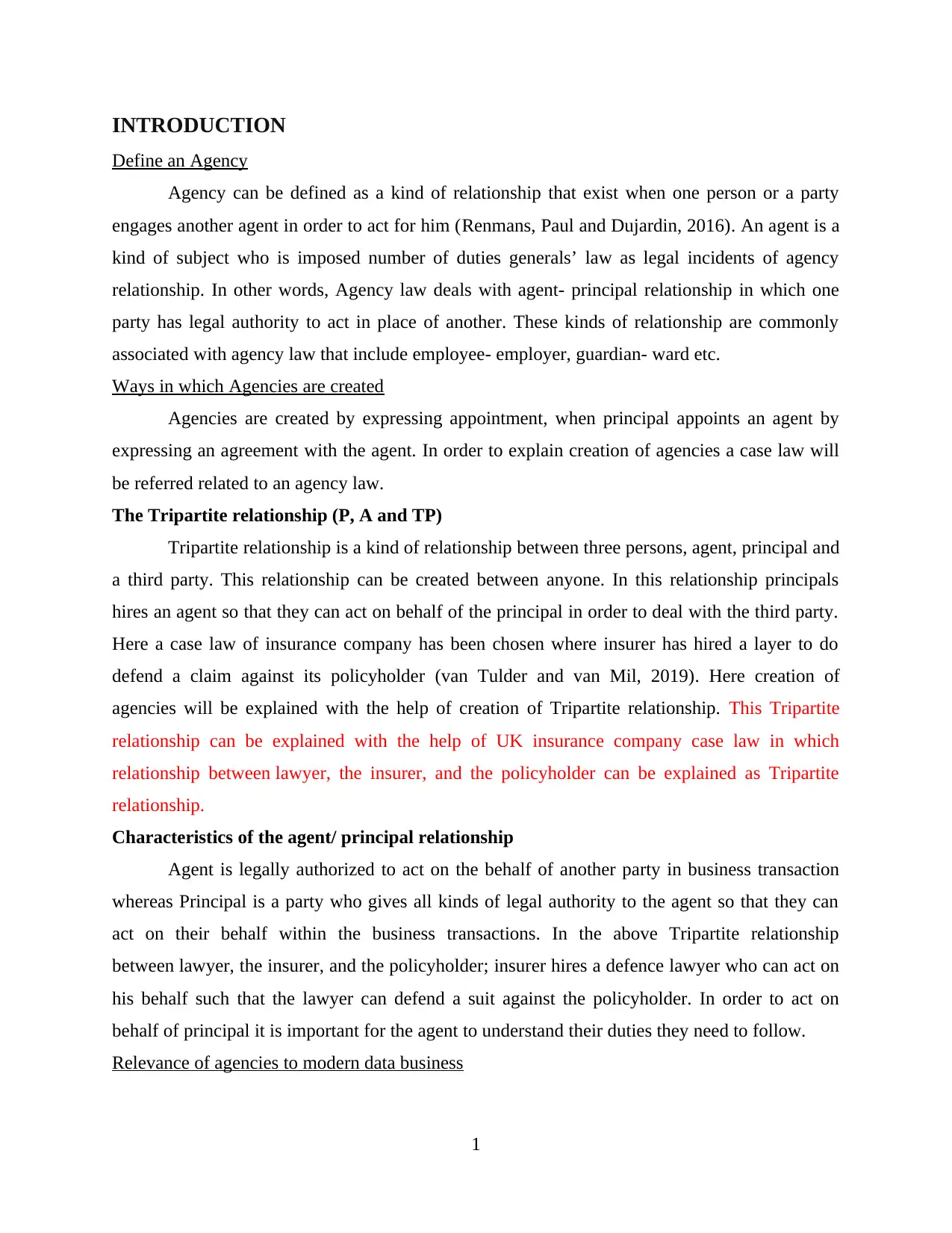
INTRODUCTION
Define an Agency
Agency can be defined as a kind of relationship that exist when one person or a party
engages another agent in order to act for him (Renmans, Paul and Dujardin, 2016). An agent is a
kind of subject who is imposed number of duties generals’ law as legal incidents of agency
relationship. In other words, Agency law deals with agent- principal relationship in which one
party has legal authority to act in place of another. These kinds of relationship are commonly
associated with agency law that include employee- employer, guardian- ward etc.
Ways in which Agencies are created
Agencies are created by expressing appointment, when principal appoints an agent by
expressing an agreement with the agent. In order to explain creation of agencies a case law will
be referred related to an agency law.
The Tripartite relationship (P, A and TP)
Tripartite relationship is a kind of relationship between three persons, agent, principal and
a third party. This relationship can be created between anyone. In this relationship principals
hires an agent so that they can act on behalf of the principal in order to deal with the third party.
Here a case law of insurance company has been chosen where insurer has hired a layer to do
defend a claim against its policyholder (van Tulder and van Mil, 2019). Here creation of
agencies will be explained with the help of creation of Tripartite relationship. This Tripartite
relationship can be explained with the help of UK insurance company case law in which
relationship between lawyer, the insurer, and the policyholder can be explained as Tripartite
relationship.
Characteristics of the agent/ principal relationship
Agent is legally authorized to act on the behalf of another party in business transaction
whereas Principal is a party who gives all kinds of legal authority to the agent so that they can
act on their behalf within the business transactions. In the above Tripartite relationship
between lawyer, the insurer, and the policyholder; insurer hires a defence lawyer who can act on
his behalf such that the lawyer can defend a suit against the policyholder. In order to act on
behalf of principal it is important for the agent to understand their duties they need to follow.
Relevance of agencies to modern data business
1
Define an Agency
Agency can be defined as a kind of relationship that exist when one person or a party
engages another agent in order to act for him (Renmans, Paul and Dujardin, 2016). An agent is a
kind of subject who is imposed number of duties generals’ law as legal incidents of agency
relationship. In other words, Agency law deals with agent- principal relationship in which one
party has legal authority to act in place of another. These kinds of relationship are commonly
associated with agency law that include employee- employer, guardian- ward etc.
Ways in which Agencies are created
Agencies are created by expressing appointment, when principal appoints an agent by
expressing an agreement with the agent. In order to explain creation of agencies a case law will
be referred related to an agency law.
The Tripartite relationship (P, A and TP)
Tripartite relationship is a kind of relationship between three persons, agent, principal and
a third party. This relationship can be created between anyone. In this relationship principals
hires an agent so that they can act on behalf of the principal in order to deal with the third party.
Here a case law of insurance company has been chosen where insurer has hired a layer to do
defend a claim against its policyholder (van Tulder and van Mil, 2019). Here creation of
agencies will be explained with the help of creation of Tripartite relationship. This Tripartite
relationship can be explained with the help of UK insurance company case law in which
relationship between lawyer, the insurer, and the policyholder can be explained as Tripartite
relationship.
Characteristics of the agent/ principal relationship
Agent is legally authorized to act on the behalf of another party in business transaction
whereas Principal is a party who gives all kinds of legal authority to the agent so that they can
act on their behalf within the business transactions. In the above Tripartite relationship
between lawyer, the insurer, and the policyholder; insurer hires a defence lawyer who can act on
his behalf such that the lawyer can defend a suit against the policyholder. In order to act on
behalf of principal it is important for the agent to understand their duties they need to follow.
Relevance of agencies to modern data business
1
⊘ This is a preview!⊘
Do you want full access?
Subscribe today to unlock all pages.

Trusted by 1+ million students worldwide
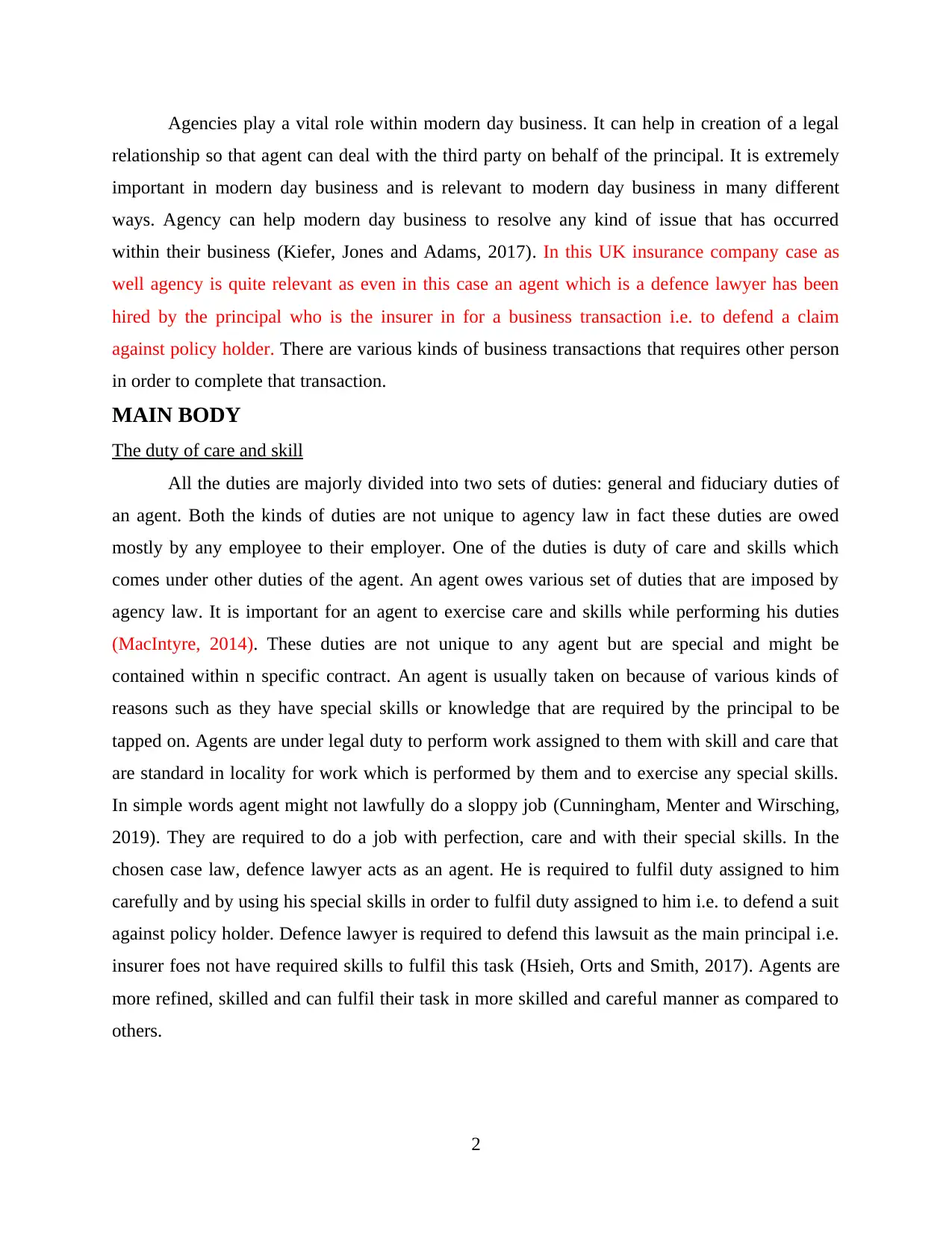
Agencies play a vital role within modern day business. It can help in creation of a legal
relationship so that agent can deal with the third party on behalf of the principal. It is extremely
important in modern day business and is relevant to modern day business in many different
ways. Agency can help modern day business to resolve any kind of issue that has occurred
within their business (Kiefer, Jones and Adams, 2017). In this UK insurance company case as
well agency is quite relevant as even in this case an agent which is a defence lawyer has been
hired by the principal who is the insurer in for a business transaction i.e. to defend a claim
against policy holder. There are various kinds of business transactions that requires other person
in order to complete that transaction.
MAIN BODY
The duty of care and skill
All the duties are majorly divided into two sets of duties: general and fiduciary duties of
an agent. Both the kinds of duties are not unique to agency law in fact these duties are owed
mostly by any employee to their employer. One of the duties is duty of care and skills which
comes under other duties of the agent. An agent owes various set of duties that are imposed by
agency law. It is important for an agent to exercise care and skills while performing his duties
(MacIntyre, 2014). These duties are not unique to any agent but are special and might be
contained within n specific contract. An agent is usually taken on because of various kinds of
reasons such as they have special skills or knowledge that are required by the principal to be
tapped on. Agents are under legal duty to perform work assigned to them with skill and care that
are standard in locality for work which is performed by them and to exercise any special skills.
In simple words agent might not lawfully do a sloppy job (Cunningham, Menter and Wirsching,
2019). They are required to do a job with perfection, care and with their special skills. In the
chosen case law, defence lawyer acts as an agent. He is required to fulfil duty assigned to him
carefully and by using his special skills in order to fulfil duty assigned to him i.e. to defend a suit
against policy holder. Defence lawyer is required to defend this lawsuit as the main principal i.e.
insurer foes not have required skills to fulfil this task (Hsieh, Orts and Smith, 2017). Agents are
more refined, skilled and can fulfil their task in more skilled and careful manner as compared to
others.
2
relationship so that agent can deal with the third party on behalf of the principal. It is extremely
important in modern day business and is relevant to modern day business in many different
ways. Agency can help modern day business to resolve any kind of issue that has occurred
within their business (Kiefer, Jones and Adams, 2017). In this UK insurance company case as
well agency is quite relevant as even in this case an agent which is a defence lawyer has been
hired by the principal who is the insurer in for a business transaction i.e. to defend a claim
against policy holder. There are various kinds of business transactions that requires other person
in order to complete that transaction.
MAIN BODY
The duty of care and skill
All the duties are majorly divided into two sets of duties: general and fiduciary duties of
an agent. Both the kinds of duties are not unique to agency law in fact these duties are owed
mostly by any employee to their employer. One of the duties is duty of care and skills which
comes under other duties of the agent. An agent owes various set of duties that are imposed by
agency law. It is important for an agent to exercise care and skills while performing his duties
(MacIntyre, 2014). These duties are not unique to any agent but are special and might be
contained within n specific contract. An agent is usually taken on because of various kinds of
reasons such as they have special skills or knowledge that are required by the principal to be
tapped on. Agents are under legal duty to perform work assigned to them with skill and care that
are standard in locality for work which is performed by them and to exercise any special skills.
In simple words agent might not lawfully do a sloppy job (Cunningham, Menter and Wirsching,
2019). They are required to do a job with perfection, care and with their special skills. In the
chosen case law, defence lawyer acts as an agent. He is required to fulfil duty assigned to him
carefully and by using his special skills in order to fulfil duty assigned to him i.e. to defend a suit
against policy holder. Defence lawyer is required to defend this lawsuit as the main principal i.e.
insurer foes not have required skills to fulfil this task (Hsieh, Orts and Smith, 2017). Agents are
more refined, skilled and can fulfil their task in more skilled and careful manner as compared to
others.
2
Paraphrase This Document
Need a fresh take? Get an instant paraphrase of this document with our AI Paraphraser
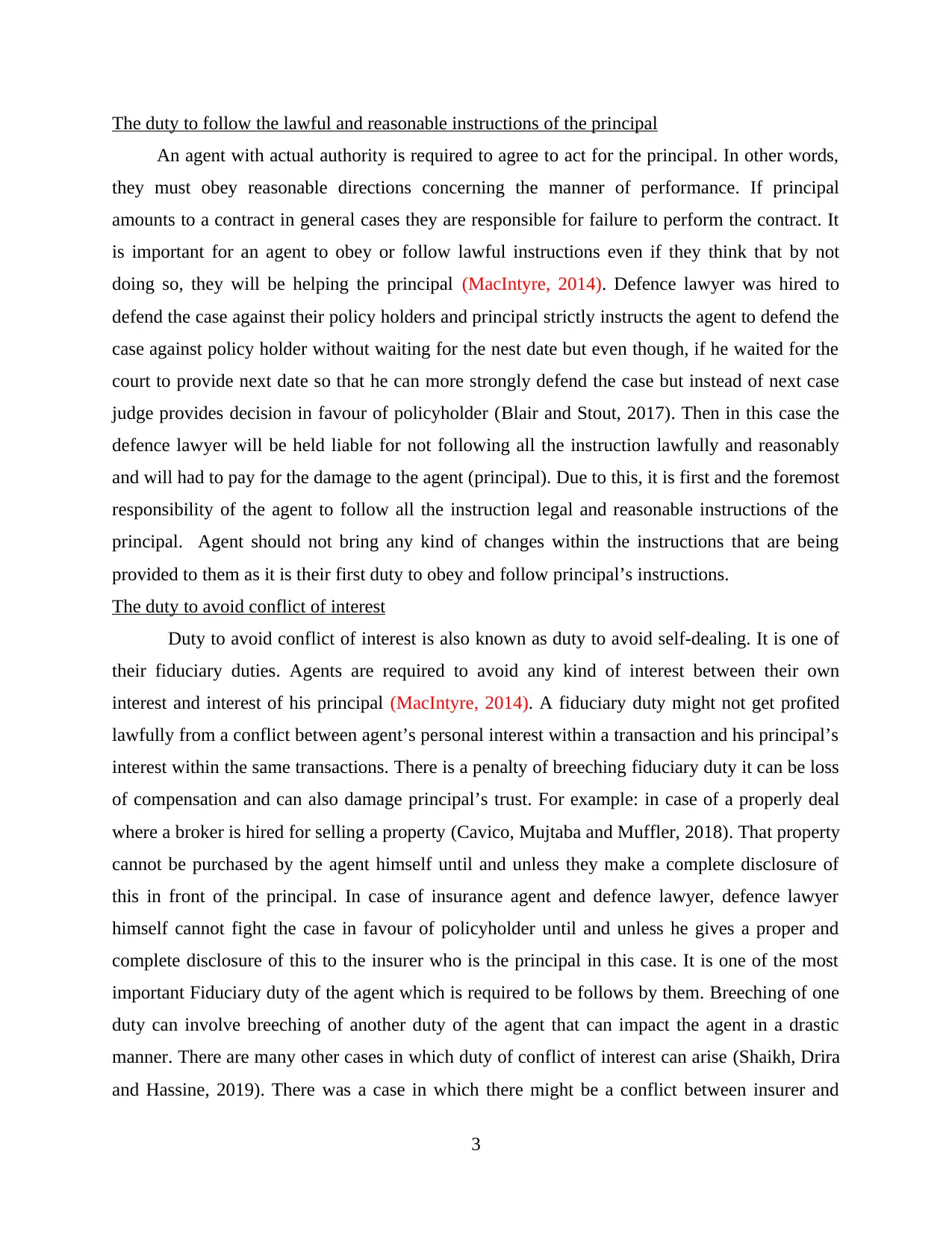
The duty to follow the lawful and reasonable instructions of the principal
An agent with actual authority is required to agree to act for the principal. In other words,
they must obey reasonable directions concerning the manner of performance. If principal
amounts to a contract in general cases they are responsible for failure to perform the contract. It
is important for an agent to obey or follow lawful instructions even if they think that by not
doing so, they will be helping the principal (MacIntyre, 2014). Defence lawyer was hired to
defend the case against their policy holders and principal strictly instructs the agent to defend the
case against policy holder without waiting for the nest date but even though, if he waited for the
court to provide next date so that he can more strongly defend the case but instead of next case
judge provides decision in favour of policyholder (Blair and Stout, 2017). Then in this case the
defence lawyer will be held liable for not following all the instruction lawfully and reasonably
and will had to pay for the damage to the agent (principal). Due to this, it is first and the foremost
responsibility of the agent to follow all the instruction legal and reasonable instructions of the
principal. Agent should not bring any kind of changes within the instructions that are being
provided to them as it is their first duty to obey and follow principal’s instructions.
The duty to avoid conflict of interest
Duty to avoid conflict of interest is also known as duty to avoid self-dealing. It is one of
their fiduciary duties. Agents are required to avoid any kind of interest between their own
interest and interest of his principal (MacIntyre, 2014). A fiduciary duty might not get profited
lawfully from a conflict between agent’s personal interest within a transaction and his principal’s
interest within the same transactions. There is a penalty of breeching fiduciary duty it can be loss
of compensation and can also damage principal’s trust. For example: in case of a properly deal
where a broker is hired for selling a property (Cavico, Mujtaba and Muffler, 2018). That property
cannot be purchased by the agent himself until and unless they make a complete disclosure of
this in front of the principal. In case of insurance agent and defence lawyer, defence lawyer
himself cannot fight the case in favour of policyholder until and unless he gives a proper and
complete disclosure of this to the insurer who is the principal in this case. It is one of the most
important Fiduciary duty of the agent which is required to be follows by them. Breeching of one
duty can involve breeching of another duty of the agent that can impact the agent in a drastic
manner. There are many other cases in which duty of conflict of interest can arise (Shaikh, Drira
and Hassine, 2019). There was a case in which there might be a conflict between insurer and
3
An agent with actual authority is required to agree to act for the principal. In other words,
they must obey reasonable directions concerning the manner of performance. If principal
amounts to a contract in general cases they are responsible for failure to perform the contract. It
is important for an agent to obey or follow lawful instructions even if they think that by not
doing so, they will be helping the principal (MacIntyre, 2014). Defence lawyer was hired to
defend the case against their policy holders and principal strictly instructs the agent to defend the
case against policy holder without waiting for the nest date but even though, if he waited for the
court to provide next date so that he can more strongly defend the case but instead of next case
judge provides decision in favour of policyholder (Blair and Stout, 2017). Then in this case the
defence lawyer will be held liable for not following all the instruction lawfully and reasonably
and will had to pay for the damage to the agent (principal). Due to this, it is first and the foremost
responsibility of the agent to follow all the instruction legal and reasonable instructions of the
principal. Agent should not bring any kind of changes within the instructions that are being
provided to them as it is their first duty to obey and follow principal’s instructions.
The duty to avoid conflict of interest
Duty to avoid conflict of interest is also known as duty to avoid self-dealing. It is one of
their fiduciary duties. Agents are required to avoid any kind of interest between their own
interest and interest of his principal (MacIntyre, 2014). A fiduciary duty might not get profited
lawfully from a conflict between agent’s personal interest within a transaction and his principal’s
interest within the same transactions. There is a penalty of breeching fiduciary duty it can be loss
of compensation and can also damage principal’s trust. For example: in case of a properly deal
where a broker is hired for selling a property (Cavico, Mujtaba and Muffler, 2018). That property
cannot be purchased by the agent himself until and unless they make a complete disclosure of
this in front of the principal. In case of insurance agent and defence lawyer, defence lawyer
himself cannot fight the case in favour of policyholder until and unless he gives a proper and
complete disclosure of this to the insurer who is the principal in this case. It is one of the most
important Fiduciary duty of the agent which is required to be follows by them. Breeching of one
duty can involve breeching of another duty of the agent that can impact the agent in a drastic
manner. There are many other cases in which duty of conflict of interest can arise (Shaikh, Drira
and Hassine, 2019). There was a case in which there might be a conflict between insurer and
3
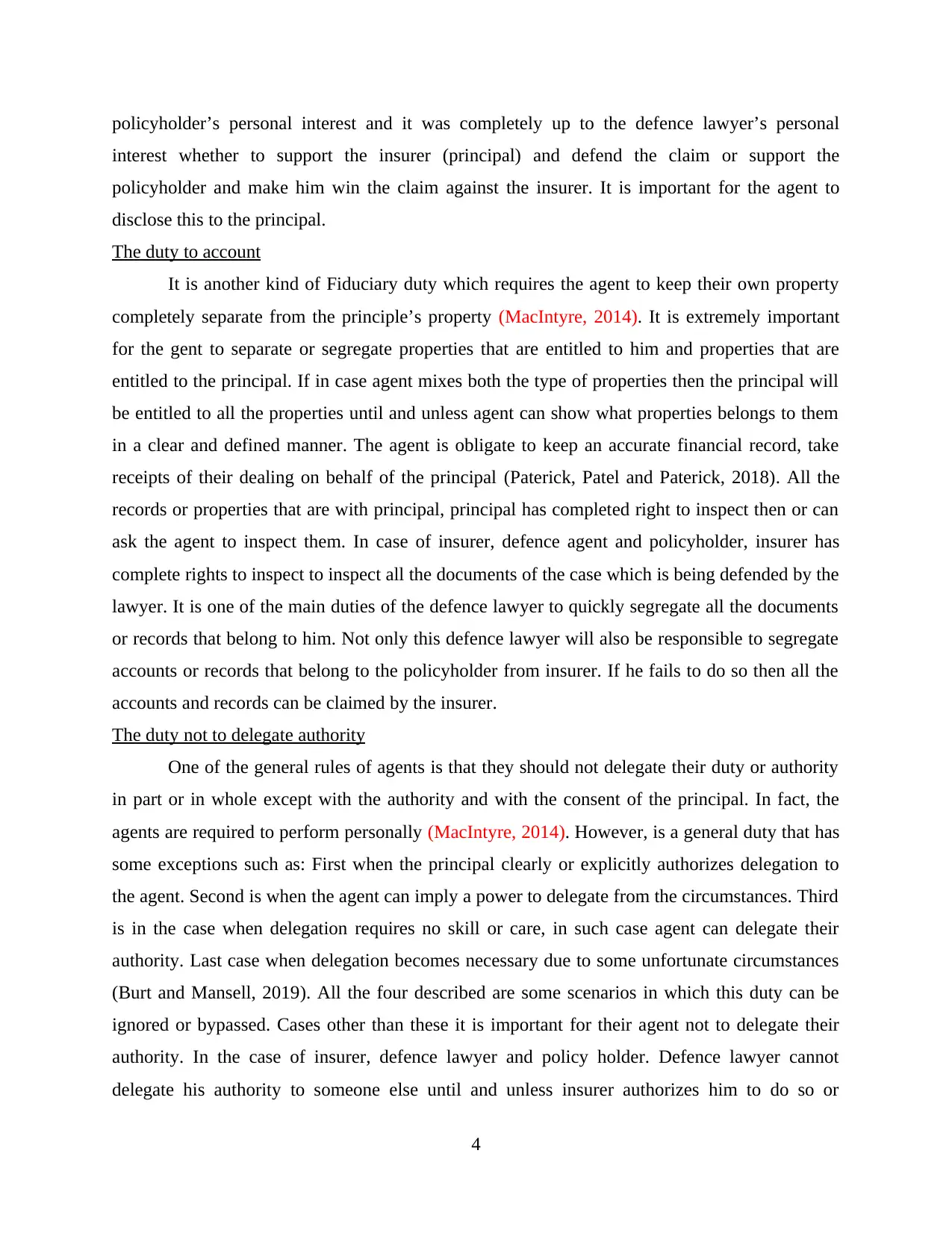
policyholder’s personal interest and it was completely up to the defence lawyer’s personal
interest whether to support the insurer (principal) and defend the claim or support the
policyholder and make him win the claim against the insurer. It is important for the agent to
disclose this to the principal.
The duty to account
It is another kind of Fiduciary duty which requires the agent to keep their own property
completely separate from the principle’s property (MacIntyre, 2014). It is extremely important
for the gent to separate or segregate properties that are entitled to him and properties that are
entitled to the principal. If in case agent mixes both the type of properties then the principal will
be entitled to all the properties until and unless agent can show what properties belongs to them
in a clear and defined manner. The agent is obligate to keep an accurate financial record, take
receipts of their dealing on behalf of the principal (Paterick, Patel and Paterick, 2018). All the
records or properties that are with principal, principal has completed right to inspect then or can
ask the agent to inspect them. In case of insurer, defence agent and policyholder, insurer has
complete rights to inspect to inspect all the documents of the case which is being defended by the
lawyer. It is one of the main duties of the defence lawyer to quickly segregate all the documents
or records that belong to him. Not only this defence lawyer will also be responsible to segregate
accounts or records that belong to the policyholder from insurer. If he fails to do so then all the
accounts and records can be claimed by the insurer.
The duty not to delegate authority
One of the general rules of agents is that they should not delegate their duty or authority
in part or in whole except with the authority and with the consent of the principal. In fact, the
agents are required to perform personally (MacIntyre, 2014). However, is a general duty that has
some exceptions such as: First when the principal clearly or explicitly authorizes delegation to
the agent. Second is when the agent can imply a power to delegate from the circumstances. Third
is in the case when delegation requires no skill or care, in such case agent can delegate their
authority. Last case when delegation becomes necessary due to some unfortunate circumstances
(Burt and Mansell, 2019). All the four described are some scenarios in which this duty can be
ignored or bypassed. Cases other than these it is important for their agent not to delegate their
authority. In the case of insurer, defence lawyer and policy holder. Defence lawyer cannot
delegate his authority to someone else until and unless insurer authorizes him to do so or
4
interest whether to support the insurer (principal) and defend the claim or support the
policyholder and make him win the claim against the insurer. It is important for the agent to
disclose this to the principal.
The duty to account
It is another kind of Fiduciary duty which requires the agent to keep their own property
completely separate from the principle’s property (MacIntyre, 2014). It is extremely important
for the gent to separate or segregate properties that are entitled to him and properties that are
entitled to the principal. If in case agent mixes both the type of properties then the principal will
be entitled to all the properties until and unless agent can show what properties belongs to them
in a clear and defined manner. The agent is obligate to keep an accurate financial record, take
receipts of their dealing on behalf of the principal (Paterick, Patel and Paterick, 2018). All the
records or properties that are with principal, principal has completed right to inspect then or can
ask the agent to inspect them. In case of insurer, defence agent and policyholder, insurer has
complete rights to inspect to inspect all the documents of the case which is being defended by the
lawyer. It is one of the main duties of the defence lawyer to quickly segregate all the documents
or records that belong to him. Not only this defence lawyer will also be responsible to segregate
accounts or records that belong to the policyholder from insurer. If he fails to do so then all the
accounts and records can be claimed by the insurer.
The duty not to delegate authority
One of the general rules of agents is that they should not delegate their duty or authority
in part or in whole except with the authority and with the consent of the principal. In fact, the
agents are required to perform personally (MacIntyre, 2014). However, is a general duty that has
some exceptions such as: First when the principal clearly or explicitly authorizes delegation to
the agent. Second is when the agent can imply a power to delegate from the circumstances. Third
is in the case when delegation requires no skill or care, in such case agent can delegate their
authority. Last case when delegation becomes necessary due to some unfortunate circumstances
(Burt and Mansell, 2019). All the four described are some scenarios in which this duty can be
ignored or bypassed. Cases other than these it is important for their agent not to delegate their
authority. In the case of insurer, defence lawyer and policy holder. Defence lawyer cannot
delegate his authority to someone else until and unless insurer authorizes him to do so or
4
⊘ This is a preview!⊘
Do you want full access?
Subscribe today to unlock all pages.

Trusted by 1+ million students worldwide
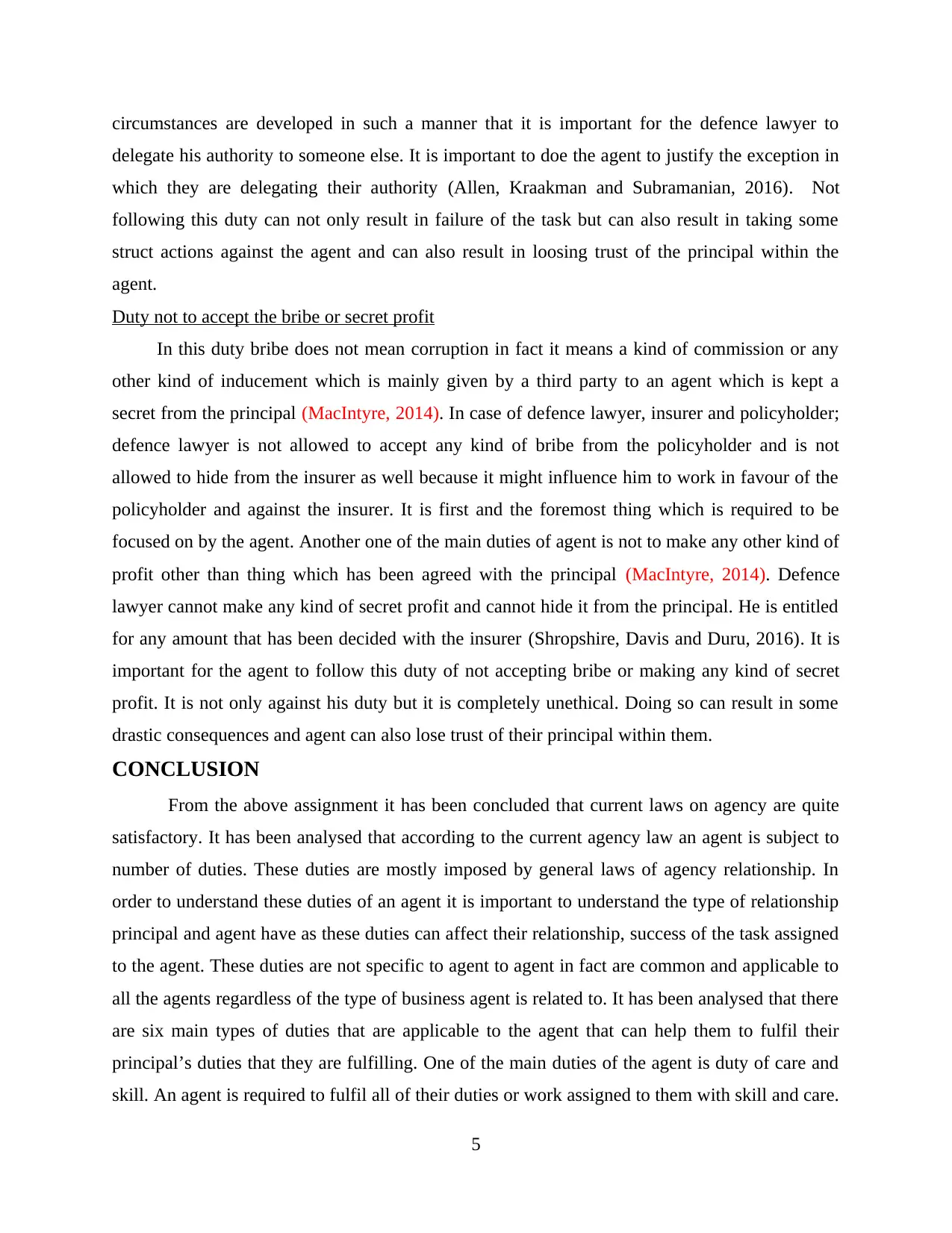
circumstances are developed in such a manner that it is important for the defence lawyer to
delegate his authority to someone else. It is important to doe the agent to justify the exception in
which they are delegating their authority (Allen, Kraakman and Subramanian, 2016). Not
following this duty can not only result in failure of the task but can also result in taking some
struct actions against the agent and can also result in loosing trust of the principal within the
agent.
Duty not to accept the bribe or secret profit
In this duty bribe does not mean corruption in fact it means a kind of commission or any
other kind of inducement which is mainly given by a third party to an agent which is kept a
secret from the principal (MacIntyre, 2014). In case of defence lawyer, insurer and policyholder;
defence lawyer is not allowed to accept any kind of bribe from the policyholder and is not
allowed to hide from the insurer as well because it might influence him to work in favour of the
policyholder and against the insurer. It is first and the foremost thing which is required to be
focused on by the agent. Another one of the main duties of agent is not to make any other kind of
profit other than thing which has been agreed with the principal (MacIntyre, 2014). Defence
lawyer cannot make any kind of secret profit and cannot hide it from the principal. He is entitled
for any amount that has been decided with the insurer (Shropshire, Davis and Duru, 2016). It is
important for the agent to follow this duty of not accepting bribe or making any kind of secret
profit. It is not only against his duty but it is completely unethical. Doing so can result in some
drastic consequences and agent can also lose trust of their principal within them.
CONCLUSION
From the above assignment it has been concluded that current laws on agency are quite
satisfactory. It has been analysed that according to the current agency law an agent is subject to
number of duties. These duties are mostly imposed by general laws of agency relationship. In
order to understand these duties of an agent it is important to understand the type of relationship
principal and agent have as these duties can affect their relationship, success of the task assigned
to the agent. These duties are not specific to agent to agent in fact are common and applicable to
all the agents regardless of the type of business agent is related to. It has been analysed that there
are six main types of duties that are applicable to the agent that can help them to fulfil their
principal’s duties that they are fulfilling. One of the main duties of the agent is duty of care and
skill. An agent is required to fulfil all of their duties or work assigned to them with skill and care.
5
delegate his authority to someone else. It is important to doe the agent to justify the exception in
which they are delegating their authority (Allen, Kraakman and Subramanian, 2016). Not
following this duty can not only result in failure of the task but can also result in taking some
struct actions against the agent and can also result in loosing trust of the principal within the
agent.
Duty not to accept the bribe or secret profit
In this duty bribe does not mean corruption in fact it means a kind of commission or any
other kind of inducement which is mainly given by a third party to an agent which is kept a
secret from the principal (MacIntyre, 2014). In case of defence lawyer, insurer and policyholder;
defence lawyer is not allowed to accept any kind of bribe from the policyholder and is not
allowed to hide from the insurer as well because it might influence him to work in favour of the
policyholder and against the insurer. It is first and the foremost thing which is required to be
focused on by the agent. Another one of the main duties of agent is not to make any other kind of
profit other than thing which has been agreed with the principal (MacIntyre, 2014). Defence
lawyer cannot make any kind of secret profit and cannot hide it from the principal. He is entitled
for any amount that has been decided with the insurer (Shropshire, Davis and Duru, 2016). It is
important for the agent to follow this duty of not accepting bribe or making any kind of secret
profit. It is not only against his duty but it is completely unethical. Doing so can result in some
drastic consequences and agent can also lose trust of their principal within them.
CONCLUSION
From the above assignment it has been concluded that current laws on agency are quite
satisfactory. It has been analysed that according to the current agency law an agent is subject to
number of duties. These duties are mostly imposed by general laws of agency relationship. In
order to understand these duties of an agent it is important to understand the type of relationship
principal and agent have as these duties can affect their relationship, success of the task assigned
to the agent. These duties are not specific to agent to agent in fact are common and applicable to
all the agents regardless of the type of business agent is related to. It has been analysed that there
are six main types of duties that are applicable to the agent that can help them to fulfil their
principal’s duties that they are fulfilling. One of the main duties of the agent is duty of care and
skill. An agent is required to fulfil all of their duties or work assigned to them with skill and care.
5
Paraphrase This Document
Need a fresh take? Get an instant paraphrase of this document with our AI Paraphraser
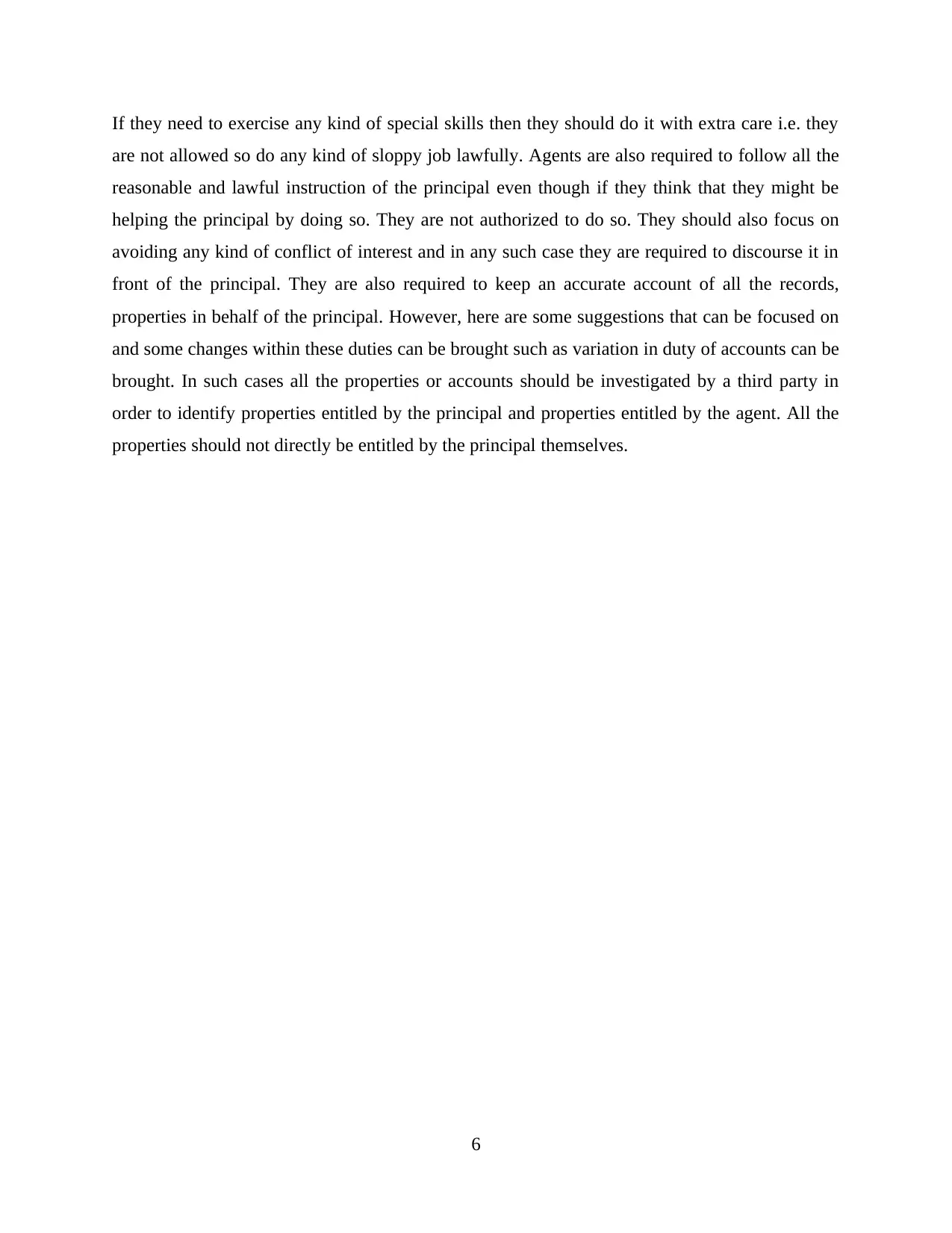
If they need to exercise any kind of special skills then they should do it with extra care i.e. they
are not allowed so do any kind of sloppy job lawfully. Agents are also required to follow all the
reasonable and lawful instruction of the principal even though if they think that they might be
helping the principal by doing so. They are not authorized to do so. They should also focus on
avoiding any kind of conflict of interest and in any such case they are required to discourse it in
front of the principal. They are also required to keep an accurate account of all the records,
properties in behalf of the principal. However, here are some suggestions that can be focused on
and some changes within these duties can be brought such as variation in duty of accounts can be
brought. In such cases all the properties or accounts should be investigated by a third party in
order to identify properties entitled by the principal and properties entitled by the agent. All the
properties should not directly be entitled by the principal themselves.
6
are not allowed so do any kind of sloppy job lawfully. Agents are also required to follow all the
reasonable and lawful instruction of the principal even though if they think that they might be
helping the principal by doing so. They are not authorized to do so. They should also focus on
avoiding any kind of conflict of interest and in any such case they are required to discourse it in
front of the principal. They are also required to keep an accurate account of all the records,
properties in behalf of the principal. However, here are some suggestions that can be focused on
and some changes within these duties can be brought such as variation in duty of accounts can be
brought. In such cases all the properties or accounts should be investigated by a third party in
order to identify properties entitled by the principal and properties entitled by the agent. All the
properties should not directly be entitled by the principal themselves.
6
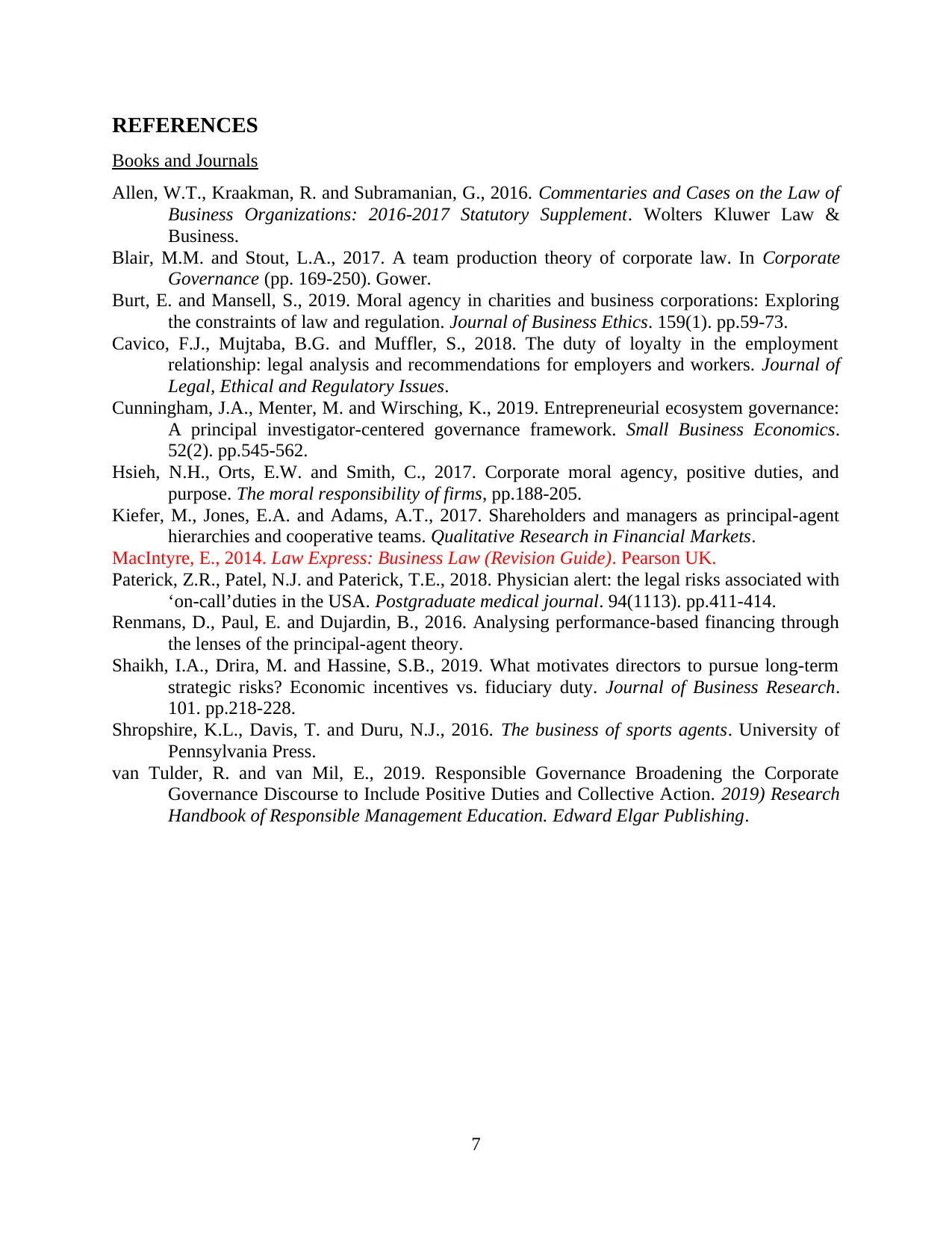
REFERENCES
Books and Journals
Allen, W.T., Kraakman, R. and Subramanian, G., 2016. Commentaries and Cases on the Law of
Business Organizations: 2016-2017 Statutory Supplement. Wolters Kluwer Law &
Business.
Blair, M.M. and Stout, L.A., 2017. A team production theory of corporate law. In Corporate
Governance (pp. 169-250). Gower.
Burt, E. and Mansell, S., 2019. Moral agency in charities and business corporations: Exploring
the constraints of law and regulation. Journal of Business Ethics. 159(1). pp.59-73.
Cavico, F.J., Mujtaba, B.G. and Muffler, S., 2018. The duty of loyalty in the employment
relationship: legal analysis and recommendations for employers and workers. Journal of
Legal, Ethical and Regulatory Issues.
Cunningham, J.A., Menter, M. and Wirsching, K., 2019. Entrepreneurial ecosystem governance:
A principal investigator-centered governance framework. Small Business Economics.
52(2). pp.545-562.
Hsieh, N.H., Orts, E.W. and Smith, C., 2017. Corporate moral agency, positive duties, and
purpose. The moral responsibility of firms, pp.188-205.
Kiefer, M., Jones, E.A. and Adams, A.T., 2017. Shareholders and managers as principal-agent
hierarchies and cooperative teams. Qualitative Research in Financial Markets.
MacIntyre, E., 2014. Law Express: Business Law (Revision Guide). Pearson UK.
Paterick, Z.R., Patel, N.J. and Paterick, T.E., 2018. Physician alert: the legal risks associated with
‘on-call’duties in the USA. Postgraduate medical journal. 94(1113). pp.411-414.
Renmans, D., Paul, E. and Dujardin, B., 2016. Analysing performance-based financing through
the lenses of the principal-agent theory.
Shaikh, I.A., Drira, M. and Hassine, S.B., 2019. What motivates directors to pursue long-term
strategic risks? Economic incentives vs. fiduciary duty. Journal of Business Research.
101. pp.218-228.
Shropshire, K.L., Davis, T. and Duru, N.J., 2016. The business of sports agents. University of
Pennsylvania Press.
van Tulder, R. and van Mil, E., 2019. Responsible Governance Broadening the Corporate
Governance Discourse to Include Positive Duties and Collective Action. 2019) Research
Handbook of Responsible Management Education. Edward Elgar Publishing.
7
Books and Journals
Allen, W.T., Kraakman, R. and Subramanian, G., 2016. Commentaries and Cases on the Law of
Business Organizations: 2016-2017 Statutory Supplement. Wolters Kluwer Law &
Business.
Blair, M.M. and Stout, L.A., 2017. A team production theory of corporate law. In Corporate
Governance (pp. 169-250). Gower.
Burt, E. and Mansell, S., 2019. Moral agency in charities and business corporations: Exploring
the constraints of law and regulation. Journal of Business Ethics. 159(1). pp.59-73.
Cavico, F.J., Mujtaba, B.G. and Muffler, S., 2018. The duty of loyalty in the employment
relationship: legal analysis and recommendations for employers and workers. Journal of
Legal, Ethical and Regulatory Issues.
Cunningham, J.A., Menter, M. and Wirsching, K., 2019. Entrepreneurial ecosystem governance:
A principal investigator-centered governance framework. Small Business Economics.
52(2). pp.545-562.
Hsieh, N.H., Orts, E.W. and Smith, C., 2017. Corporate moral agency, positive duties, and
purpose. The moral responsibility of firms, pp.188-205.
Kiefer, M., Jones, E.A. and Adams, A.T., 2017. Shareholders and managers as principal-agent
hierarchies and cooperative teams. Qualitative Research in Financial Markets.
MacIntyre, E., 2014. Law Express: Business Law (Revision Guide). Pearson UK.
Paterick, Z.R., Patel, N.J. and Paterick, T.E., 2018. Physician alert: the legal risks associated with
‘on-call’duties in the USA. Postgraduate medical journal. 94(1113). pp.411-414.
Renmans, D., Paul, E. and Dujardin, B., 2016. Analysing performance-based financing through
the lenses of the principal-agent theory.
Shaikh, I.A., Drira, M. and Hassine, S.B., 2019. What motivates directors to pursue long-term
strategic risks? Economic incentives vs. fiduciary duty. Journal of Business Research.
101. pp.218-228.
Shropshire, K.L., Davis, T. and Duru, N.J., 2016. The business of sports agents. University of
Pennsylvania Press.
van Tulder, R. and van Mil, E., 2019. Responsible Governance Broadening the Corporate
Governance Discourse to Include Positive Duties and Collective Action. 2019) Research
Handbook of Responsible Management Education. Edward Elgar Publishing.
7
⊘ This is a preview!⊘
Do you want full access?
Subscribe today to unlock all pages.

Trusted by 1+ million students worldwide
1 out of 9
Related Documents
Your All-in-One AI-Powered Toolkit for Academic Success.
+13062052269
info@desklib.com
Available 24*7 on WhatsApp / Email
![[object Object]](/_next/static/media/star-bottom.7253800d.svg)
Unlock your academic potential
Copyright © 2020–2026 A2Z Services. All Rights Reserved. Developed and managed by ZUCOL.





